Cancer Survivorship
- Cancer Risk Factors and Prevention

Prof. Dr. Volker Arndt
Head
The Unit of Cancer Survivorship was established in March 2016 and is associated with the Department of Clinical Epidemiology and Aging Research. The term "cancer survivorship" refers to the life with or after cancer.
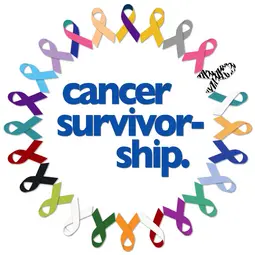
Fortunately, survival rates for most cancers have improved significantly over the last few decades. It is estimated that there are currently around five million cancer survivors in Germany (persons who have been diagnosed with, and are living with or beyond cancer). Over 60% of these are long-term survivors, i.e. persons who have survived for five years or more after being diagnosed with cancer. For many of those, cancer is considered a chronic disease that can affect their health and quality of life even years after diagnosis.
Our research
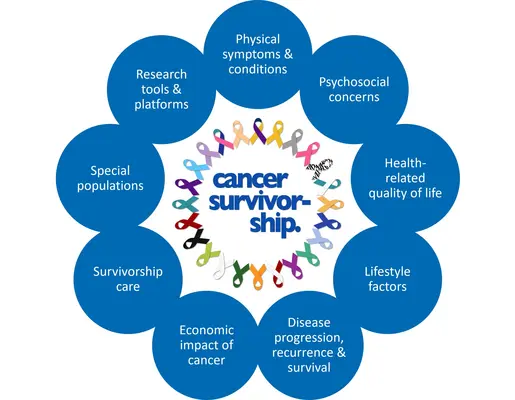
Our research focuses on the short- and long-term physical, psychological, social, and economic effects of cancer and its treatment on cancer survivors and their families. We also study which groups of cancer patients (e.g. by sex, type of cancer, or social background) are more likely to suffer from such consequences. In addition, we are actively engaged in international projects to develop instruments to assess the health-related quality of life of cancer patients and survivors. With the results of our research, we aim to identify starting points for improved risk-adapted care and aftercare.
Projects
The origin of our work is rooted in large population-based cohort studies on health-related quality of life, long-term and late effects of cancer (CAESAR, PROCAS, DACHS/ IMPACT). In addition, we did further studies on specific topics such as the impact of the COVID-19 pandemic on cancer patients and survivors (CroKuS) or unmet needs (EiBe), as well as registry based studies (CapGer, CoDiCa). We are also involved in international projects and initiatives such as EORTC QLQ-SURV, EUonQoL and INE-CSC. After numerous studies have highlighted the needs of cancer survivors, we are also involved in an intervention project (IMPULS-A), in which a survivorship program is developed and evaluated in a randomized controlled trial.
IMPULS-A – Implementierung eines Unterstützungsprogramms für Langzeitkrebsüberlebende im Alter / Implementation of a support program for long-term cancer survivors aged 65 and older (in cooperation with the NCT Heidelberg)
Approximately 2/3 of the 5 million cancer survivors in Germany are over 65 years old. Elderly cancer survivors are characterized by reduced physical reserves and the complex interplay between long-term and late effects of cancer and other health problems. It is important to implement a multifaceted and interdisciplinary approach to post-treatment for older cancer survivors following acute treatment, with focus on the, diverse problem areas pertinent to their age and needs. This comprehensive approach could reduce the risk of subsequent long-term and late effects. The IMPULS-A project aims to develop, implement and evaluate a survivorship program for older cancer survivors that is based on a better network of regional care services for cancer survivors. The effectiveness of this regional network project in comparison to the usual follow-up care is to be evaluated in a randomized controlled design.
Participants in the intervention group will receive regular assessments of their support needs. If needs are identified, a care navigator will suggest appropriate counseling and treatment options that are tailored to the survivor's personal preferences. In addition, recommendations will be made for typical age-specific needs after cancer, and detailed information materials (digital and analog) will be provided in easy-to-understand language.
In addition to effects on health literacy, the effects on quality of life, utilization, personal resources and treatment satisfaction as well as feasibility are to be examined.
INE-CSC – Implementation Network Europe „Cancer Survivorship Care“ (PI Professor Josephine Hegarty, University College Cork, Ireland)
The main aim of this European collaboration is to support the translation of evidence-based interventions into routine clinical practice as part of a cross boundary, systems level cancer survivorship pathway and ultimately enhance the health and wellbeing of cancer survivors.
CoDiCa – Causes of Death in Cancer Patients (in cooperation with the Epidemiological cancer registry of Baden-Württemberg, the Centre for Cancer Registry Data (ZfKD), and the German Network of Cancer Registries – GNCR)
While the survival rate of cancer patients continues to improve, non-cancer events including potential long-term and late effects are now competing with cancer as the underlying cause of death. However, limited studies have focused on the cause-specific mortality in overall population of patients with cancer. Mortality patterns and the risk of non-cancer mortality in patients with cancer remain unknown. Therefore, the purpose of this study is to characterize the causes of death among patients with cancer in Germany according to cancer type (and stage), calendar year, sex and patient age, time after diagnosis, and histology and mode of treatment.
The results of the pilot study based on data from the Baden-Württemberg Cancer Registry showed an increased risk of death due to infections, liver diseases and suicides in cancer patients compared to the general population. The results of the nationwide study will provide further details, helping to improve survivorship care and long-term outcomes for cancer patients.
LUChS – Longitudinal Quality of Life of Cancer Survivors (in cooperation with Klinikum Stuttgart and Onkologischer Schwerpunkt Stuttgart (OSP))
This project aims to identify cancer survivors who could be susceptible to long-term/late effects of cancer and its treatments by identifying trajectories of health-related quality of life (HRQoL) and symptom burden. Since 2003, the OSP has been collecting HRQoL from cancer survivors who were treated at one of the OSP clinics. Participants complete a HRQoL questionnaire at time of recruitment (during inpatient stay or shortly after discharge) and annually, for up to 10 years thereafter. These HRQoL data, together with detailed available clinical data, provide a unique opportunity to study the survivorship issues/needs of an increasing group of cancer survivors over time. For the LUCHS project, we focus on survivors of breast, prostate, or colorectal cancer.

DACHS – Darmkrebs: Chancen der Verhütung durch Screening / Colorectal cancer: chances for prevention through screening
IMPACT – Impact of clinical determinants, therapy, and lifestyle factors on long-term and late effects among colorectal cancer survivors
(in cooperation with Clinical Epidemiology and Aging Research[C070] and others)
The DACHS study is an epidemiological case-control study. Since 2003, colorectal cancer patients and randomly selected control participants with no history of colorectal cancer have been recruited for this study. The control participants and patients are matched with respect to age, sex, and their county of residence. Patients are regularly followed up for years to assess the course of their disease. Recent funding (IMPACT3) will extend this follow-up up to 20 years after diagnosis.
In addition to the repeated patient-reported outcomes during follow-up, blood samples were also collected at the start of the study. Together with the tumor histology samples, these can provide valuable information with regard to understanding the molecular biological aspects of the development of long-term and late effects.
Using data from DACHS, we have shown that comorbidities rather than older age was associated with higher healthcare use. Furthermore, we found that lifestyle factors such as lower levels of physical activity was associated with more fatigue, However, changing towards a healthier lifestyle since cancer diagnosis (e.g. more physical activity, healthier diet, moderating alcohol consumption or stopping with smoking) could improve HRQOL and reduce symptoms at follow-up.
A further study by our group in this project has shown that minimally invasive surgical techniques used in patients with early stage (I-II) colorectal cancer with the intention of a gentler procedure and reduced postoperative complications showed no differences in general quality of life compared to open surgery, but a higher risk of colorectal cancer recurrence.

EUonQoL – Quality of Life in Oncology: Measuring what matters for Cancer Patients and Survivors in Europe (in cooperation with the EUonQoL study group)
This project aims to contribute to the EU initiatives against cancer by developing, piloting, and validating the European Oncology Quality of Life Toolkit (EUonQoL-Kit) for use among cancer patients and survivors in Europe. The digitally administered toolkit is developed together with patient representatives and stakeholders from a patient-centered perspective, and adjusted to different disease phases. The final EUonQoL-Kit would be applicable for use in future periodic surveys for evaluation of health policy interventions.
The EUonQoL-Kit is currently validated in a pilot survey in a wide European sample of patients at different stages of the cancer care continuum. Our working group was actively involved in several working packages in the development and validation of the German version of the toolkit. This included literature review, review and translation of the toolkit and study material, as well as the recruitment and data collection.

EiBe - Evaluation individueller Bedürfnisse von Menschen mit und nach Krebs / Evaluation of individual needs of people living with and after cancer (in cooperation with the Cancer Information Service)
The Cancer Information Service (KID) offers free counseling for all questions related to cancer. The study idea arose from the interest of the KID to quantify the unmet needs of their clients with cancer. For this purpose, the “CASUN” (“Cancer Survivors' Unmet Needs”) questionnaire was translated into German and applied as a part of the regular KID user survey.
The results showed that users of the KID report a high number of unmet needs. Many of them have several unmet needs and they do not only seek information about the cancer itself, but also regarding the improvement of quality of life and healthcare in general. Participants who are female, have lower education, or living alone have high unmet needs. The most common unmet needs include networking and coordination between healthcare practitioners, access to complementary/alternative treatment methods and help in dealing with side effects and treatment complications.
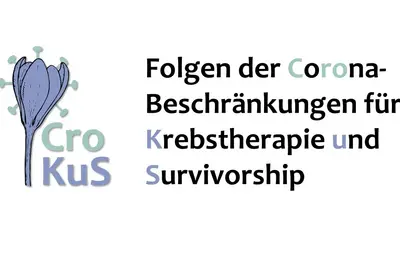
CroKuS – Folgen der Corona-Beschränkungen für Krebstherapie und Survivorship / Consequences of Corona restrictions for cancer therapy and survivorship (in cooperation with Health Economics, Cancer Information Service, Baden-Württemberg Cancer Registry)
The COVID-19 pandemic affected health systems worldwide. In this population-based cross-sectional survey, cancer patients and survivors living in Baden-Württemberg, Germany, were asked about restrictions due to the COVID-19 pandemic, including social life, work, oncological care, and economic aspects.
An evaluation of the potential consequences on participants’ health was conducted to derive evidence-based recommendations for health policies. The study showed that about 20% participants reported changes in oncological care. Participants who experienced changes in active treatment (e.g. delay of surgery, change of chemotherapy scheme) reported significantly more depression and anxiety, more symptoms, and a lower functioning and overall quality of life.
Clinical data reported to the cancer registry until 2026 will be used to evaluate further clinical aspects, e.g. whether a delay in diagnosis and start of therapy is associated with a higher rate of recurrence or with a poorer survival.
CapGer – Cancer prevalence in Germany (in cooperation with the Centre for Cancer Registry Data (ZfKD)
Due to improved survival rates, but also due to demographic ageing, the number of cancer survivors in Germany is increasing. However, detailed information on the overall prevalence of cancer in Germany was previously lacking. The aim of the study was to determine the total number of cancer survivors in Germany, broken down by tumor type, gender, age and time since diagnosis. For this purpose, the 25-year cancer prevalence in Germany was first calculated using the latest data on cancer incidence and survival available from the Center for Cancer Registry Data (ZfKD) at the Robert Koch Institute using the method of Pisani et al. The 25-year prevalence stratified by tumor entity, age and gender were then extrapolated to lifetime prevalence using the corresponding ratios of overall prevalence and 25-year prevalence from the Surveillance Epidemiology and End Results (SEER) data. The results show that at the end of 2017, a total of 4.65 million people were living with or after cancer in Germany, including 2.10 million men and 2.55 million women, and that the number is currently increasing by 100,000 persons per year. Due to demographic ageing and, in particular, the entry of the “baby boomers” into the over-50s generation, the number of cancer survivors in Germany will continue to rise in the coming years.
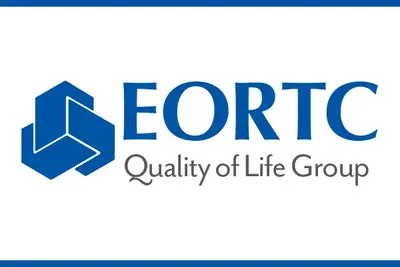
EORTC QLQ-SURV (in cooperation with Netherlands Cancer Institute and the EORTC-QLQ Study Group)
Previous instruments to assess health-related quality of life (HRQoL) were mostly developed to assess HRQoL during the acute treatment phase. With a growing number of cancer survivors, it is imperative to consider their HRQoL in the survivorship phase. Potential effects could be adverse and long-term. These include persistent fatigue, pain, musculoskeletal problems, peripheral neurological symptoms (e.g. polyneuropathy), body image issues, sexual dysfunction, relationship problems, cognitive dysfunction, anxiety and depression, and fear of recurrence/ progression. Survivors may also face socioeconomic challenges such as return to work, loss of income, and difficulties in obtaining insurance, financial loans, mortgages. On the other hand, there is evidence that surviving cancer can have positive psychological effects. All these effects, both positive and negative, might impact on the individual’s HRQOL. This project aims to develop a patient-reported outcome measure that can address the survivorship context. Phases I-III in the development of this questionnaire has already completed. Throughout these phases the questionnaire module (SURV-100) has been developed and pre-tested; and furthermore three site-specific add-on modules for breast cancer (BR-SURV45), colorectal cancer (CR-SURV34), and prostate cancer (PR-SURV30) have been developed.
The project is now in phase IV – which is the final phase –, and which consists of a large scale international psychometric and cross-cultural validation study of the questionnaire.

PROCAS – Prostate Cancer Survivorship in Switzerland
(in cooperation with National Institute for Cancer Epidemiology and Registration, c/o University of Zurich, Switzerland)
This study aimed to better understand the health-related quality of life (HRQoL) and late effects of treatment in long-term prostate cancer survivors (five and more years post-diagnosis). The study has explored personal and medical determinants of long-term HRQoL, such as treatment type, age, and comorbidities, aiming to contribute to the improvement of follow-up care. The results showed, for example, that long-term survivors who had nerve-sparing prostatectomy had similar symptom burden and comparable overall quality of life as long-term survivors who did not undergo nerve-sparing surgery. The only differences were found in relation to sexual activity. Men who had nerve-sparing surgery reported higher sexual activity than those who could not undergo nerve-sparing surgery. Regarding urinary incontinence and other scales of the quality of life instruments used, no differences were found between the two groups.

LinDe – Lebensqualität in Deutschland / Quality of life in Germany (in cooperation with Clinical Epidemiology and Aging Research)
To identify and quantify possible functional impairments and long-term effects in cancer survivors, it is important to compare whether there are differences in health-related quality of life (HRQoL) with the German general population.
The LinDe study was initiated to generate reference data on HRQoL and further potential problems (stress, depression) for studies involving cancer survivors.
Studies using LinDe data showed that although the general HRQoL of cancer survivors is comparable to that of controls of the same age, specific differences in symptoms are reported, even many years after diagnosis. Furthermore, long-term breast cancer survivors under the age of 80, for example, showed a significantly higher prevalence of depressive symptoms compared to women of the same age without cancer (30% to 24%). However, this was mainly the case if the cancer was metastasized or if a recurrence had occurred since initial diagnosis.

CAESAR „Cancer Survivorship – a multi-regional population-based study“. (in cooperation with Clinical Epidemiology and Aging Research and six population-based cancer registries in Germany)
In view of increasing survival rates of cancer, aspects of health-related quality of life (HRQoL), the current life situation and the question of possible long-term effects are becoming increasingly important.
The first population-based survey of the study was conducted in six federal states (Schleswig-Holstein, North Rhine-Westphalia, Rhineland-Palatinate, Hamburg, Bremen and Saarland) in 2009/2010.
More than 7,000 people who had been diagnosed with breast, colorectal or prostate cancer at least five years previously took part in the study. Participants completed a questionnaire that covered HRQoL, current health status, as well as potential negative and positive effects of cancer.
A follow-up survey of the study was conducted in 2018/2019. It was aimed at all participants in the initial survey who were still alive and had given their consent to be contacted again. More than 2,700 participants took part in the follow-up survey.
As part of the follow-up study, the treating physicians of the participants were also asked to complete a questionnaire with the aim of obtaining a more differentiated picture of treatments and comorbidities.
The results show that long-term survivors of breast, colorectal or prostate cancer report good quality of life overall 5-15 years after diagnosis, comparable to the general population, provided that no recurrence or second tumor has occurred. However, younger long-term survivors reported deficits, especially in the psychosocial area, and overall a tumor-specific pattern of complaints. There were also indications of gender-specific impairments in sexuality and body image among long-term survivors of colorectal cancer. Fortunately, almost two-thirds of long-term survivors of breast, colorectal or prostate cancer who are of working age are able to return to their jobs. However, financial problems were observed in the event of retraining or after a reduction in working hours, which can affect health-related quality of life. Even almost 10 years after the initial survey, i.e. 14–24 years after diagnosis of cancer, there were still increased specific symptoms and functional limitations. The pattern varied depending on age, gender and disease status. Overall, however, these long-term survivors rated their health-related quality of life and general health status slightly better than people of the same age who had never had cancer. Despite this encouraging finding, the results indicate the need for a comprehensive, risk-adapted survivorship care program to identify and treat possible long-term and late effects after the diagnosis and treatment of cancer.
Team
Cancer Survivorship addresses multiple aspects in the life of cancer survivors. This multidisciplinarity is exemplified by the diverse professional backgrounds of our team, which include Medicine, Clinical Epidemiology, Public Health, Psychology, Pharmacy, Physical Therapy, Economics:
-
Maya Basbous
- Show profile
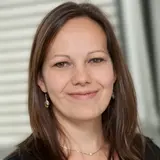
Dr. Daniela Doege
-

Julien Frick
-
Yifeng Gao
-
Chien-Tzu Lee
-
Zhiwei Lian
-

Stuti Sinha
- Show profile

Dr. Melissa Thong
-

Chunsu Zhu
-

Zhounan Zhu
Selected Publications
Doege D, Frick J, Eckford RD, Koch-Gallenkamp L, Schlander M, Baden-Württemberg Cancer Registry, Arndt V.
Thong MSY, Boakye D, Jansen L, Martens UM, Chang-Claude J, Hoffmeister M, Brenner H, Arndt V
Arndt V, Koch-Gallenkamp L, Jansen L, Bertram H, Eberle A, Holleczek B, Schmid-Hopfner S, Waldmann A, Zeissig SR, Brenner H
Get in touch with us

